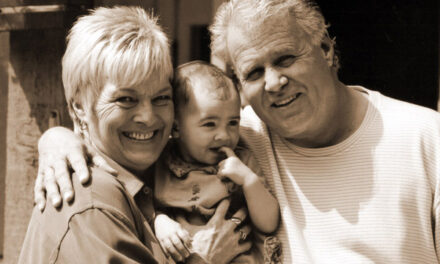by Mary Ellen Tippin
As an older adult, I have read many clever phrases about the joys of grandparenting:
“Children are the rainbow of life. Grandchildren are the pot of gold.”
“The best parents get promoted to grandparents.”
“A grandparent’s love will never grow ‘old.’”
“There’s no place like home … except Grandma’s.”
But sometimes being a grandparent is just plain hard, especially when it involves a special-needs grandchild.
Let me tell you just a bit of my journey.
I have five grown children and eighteen grandchildren. My grandchildren range in age from fifteen down to 6 months. Nine of them live close by and I see them very regularly. Three of our children live away from us and one lives overseas.
Since my husband is on the verge of retirement, we decided to take three months and stay in the country and city where our oldest daughter lives. It’s in Eastern Europe and the cost of living is very affordable, making it a good place for us to have an extended stay. We made this decision because we see this daughter’s family so seldom. (It had been a year and a half since we had been there, and they have not been in the US for more than two years.)
This daughter and her husband in Europe have two adopted daughters, one twelve and the other six. The six-year-old, Emi, is actually from the country where they’re living, and she has Down syndrome. We have not lived near this daughter since her oldest child was a baby.
As any grandparent can attest, long-distance grandparenting is a challenge at best.
When the distances become this great, the obstacles are even greater. Of course we can still FaceTime, but with an eight-hour time difference, that also has its challenges.
And we’re learning about the incredible effort my daughter and her family have to make to function every day: They don’t have a car, so they walk or take the metro, bus, or tram to get anywhere—including simple trips for groceries, which they then have to haul home, rain or shine. My daughter also has to take Emi to school every day and pick her up—a rather strenuous trip, especially with a child who has Down syndrome. It all confirms how much we have missed having extended time with them in person.
Our purpose in going was, first, to lighten our daughter’s load for a few months, especially as it related to Emi.
I have not spent a great deal of time around children with Down syndrome, although I have a near acquaintance that actually has two Downs children. She is a bit of a wiz bang and her life has never seemed particularly heavy to me, but now I see how I wrong I have been.
All the good intentions I came with on this trip, to help with this special-needs granddaughter, turned out to be so much harder than I ever could have imagined.
Here’s just one small example:
My daughter does some therapy activities with Emi every day, and I wanted to do this a few days a week—helping her learn her letters and numbers, etc. So I tried … but each thing I would bring out to enhance her learning—cards, blocks, or buttons—she would throw across the room or scatter them all over the floor with one sweep of her hand.
Gentle reprimands that I might use with another child were worthless; nothing seemed to deter her from this behavior. She would look at me and yell, “NO!” many, many times when I would ask her to do something. This would be followed with, “I’m sorry. I’m sorry,” right before she did it again. Even things I was sure she would consider fun held no appeal and seemed pointless.
(Just a side note of irony: after several of these episodes Emi said to me, “Grandma, school?” I couldn’t believe my ears. I thought she was as miserable as I was while we did “school,” yet she wanted to do more!)
Now we are on our sixth week here, and I’d like to report that we have made amazing progress with our granddaughter, and she is so much more cooperative than she used to be. I would like to report that, but it wouldn’t be the truth! We have made a little progress, but not much.
We are, however, understanding her better and she is understanding us better, too.
We are learning to give her time to process things and come to a better response than just a giant, “NO!” We are learning to love her even though none of the expectations we had hoped for have work out.
We are learning to enjoy the good things, like her absolute love for singing and nursery rhymes … by the hour even. We are learning to belly laugh with her when she thinks something is funny, and pretty soon we do, too.
We are learning to accept and love her for who she is, with her quirks and flaws, because truth be told, my impatience, hurried attitude, and unkindness are no less “unattractive” than her little idiosyncrasies.
It has been a challenge, and it will continue to be. Love is hard. Acceptance is hard. Giving up your expectations is hard. Helping others is hard. And yet my husband and I are so blessed. We are so blessed to be able to be here and really get to know two of our precious granddaughters in a way that would never be possible if we hadn’t come.
We want to love them unconditionally … just the way we love to be loved. And when Emi runs to the door to meet us and yells, “Grandma, Grandpa! Grandma, Grandpa! Welcome!” and gives us a smile and a big hug, we know it is worth it.
Read more from Mary Ellen here.

Mary Ellen Tippin is author of six children’s books. (Find out more at maryellentippin.com.) In addition to writing, she enjoys music, flowers, hosting people in her home, and influencing her ever-growing number of grandchildren. She and her husband, RJ, live near Newton, KS.





